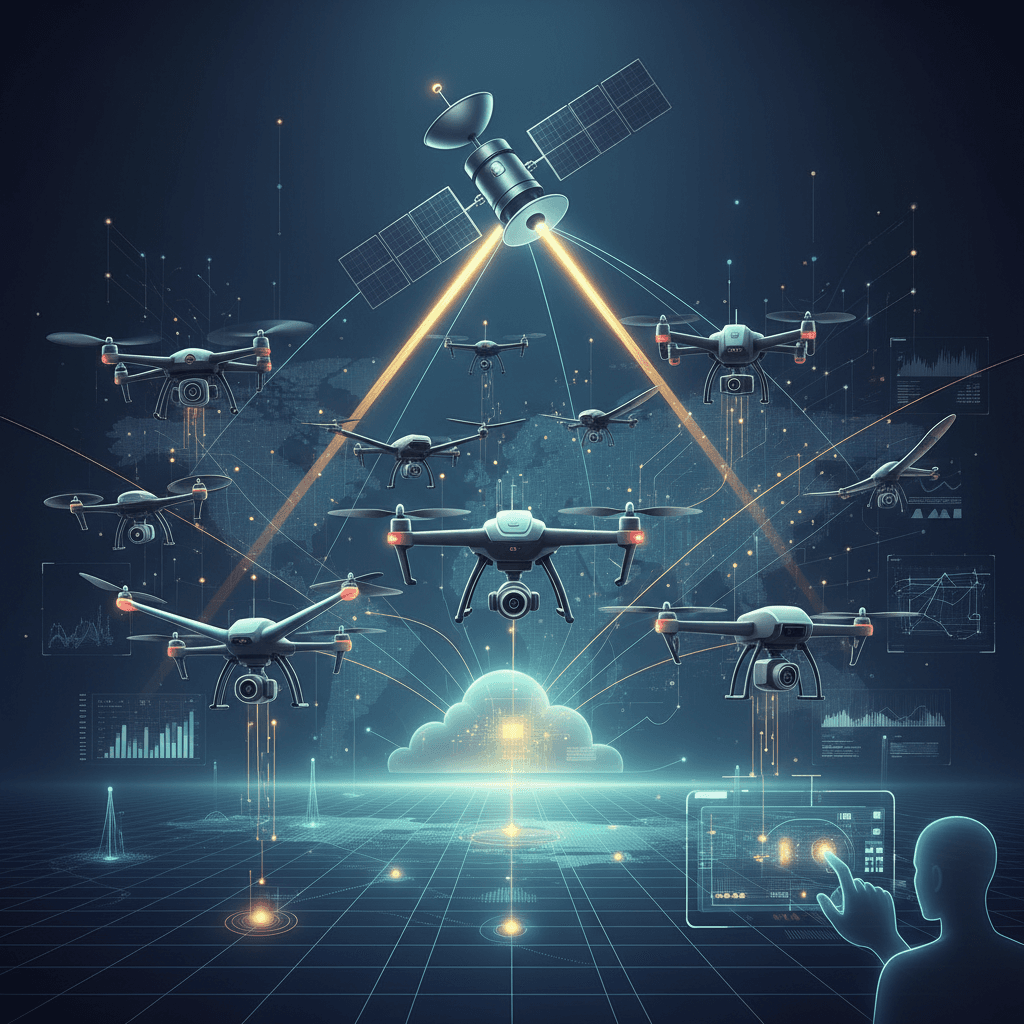BSNL-Viasat Satellite Alliance Powers India's AI Drone Revolution
India's skies open: BSNL-Viasat partnership fuels AI-driven drone ops and talent development, transforming low-altitude sectors.
October 27, 2025

In a strategic move poised to significantly advance India's burgeoning drone and satellite technology sectors, state-owned telecommunications firm Bharat Sanchar Nigam Limited (BSNL) and global satellite communications company Viasat are deepening their partnership. The collaboration, formally advanced at the India Mobile Congress 2025, centers on commercializing satellite-based services for Uncrewed Aerial Vehicles (UAVs) and fostering a skilled workforce to support this ecosystem.[1][2][3] This initiative is set to create a robust framework for complex drone operations, particularly those powered by artificial intelligence, by providing the critical connectivity required for flying beyond visual line of sight (BVLOS). The alliance aims to unlock the potential of India's low-altitude economy, an emerging sector encompassing drones and advanced air mobility operating below 3,000 meters.[1][4][3]
The collaboration is twofold, focusing on both technology deployment and human capital development. The technological cornerstone is the introduction and commercialization of Viasat's Velaris service for the Indian market.[1][5][6][7] Velaris operates on Viasat’s global L-band satellite network, a system designed for high-reliability and safety-critical applications, providing secure and resilient connectivity for UAVs.[1][6][7] This is essential for BVLOS operations, where drones operate far from their pilot, making direct radio line-of-sight communication impossible. By enabling constant, reliable command, control, and data links, Velaris will allow drones to be safely integrated into commercial airspace for a host of advanced applications.[1][2][4] Complementing this technological push is a significant investment in skills development. The partnership will establish a Centre of Excellence for UAVs, the Internet of Things (IoT), and related technologies at BSNL's Bharat Ratna Bhim Rao Ambedkar Institute of Telecom Training (BRBRAITT) in Jabalpur.[1][2][4][6][7] This center will provide engineering students with practical training and hands-on demonstrations of satellite technology, aligning with the government's 'Skill India' and 'Digital India' missions and creating a pipeline of talent ready for the next wave of aerial innovation.[1][2][8]
The implications of this enhanced satellite connectivity for the artificial intelligence industry are profound. The stable, uninterrupted data streams provided by services like Velaris are a fundamental enabler for sophisticated AI applications on drones. AI-driven systems for autonomous navigation, real-time data analysis, and computer vision require constant connectivity to function effectively, especially during BVLOS missions.[1][5] AI algorithms are critical for functions such as detect-and-avoid (DAA) systems, which allow drones to identify and maneuver around obstacles like buildings, power lines, or other aircraft, a vital step toward fully autonomous flights in complex airspace.[5] Furthermore, many drones, constrained by size, weight, and power (SWaP) limitations, lack the onboard computing capacity to run complex AI models.[1][5] Reliable satellite communication allows these drones to offload heavy data processing to powerful cloud-based AI platforms, receiving critical analysis and instructions back in real time. This capability is set to accelerate the deployment of smarter drones across various Indian industries.[3]
The partnership between BSNL and Viasat is expected to catalyze the adoption of AI-powered drone solutions across multiple sectors critical to India's economy. In agriculture, UAVs equipped with multispectral sensors can stream data via satellite for AI analysis, enabling precision farming techniques such as identifying crop stress, managing irrigation, and optimizing the application of fertilizers and pesticides.[4][9] For infrastructure management, drones can conduct safer, faster, and more accurate inspections of assets like bridges, power lines, and pipelines.[10][11][12] AI algorithms can analyze high-resolution images captured by these drones to automatically detect defects like cracks or corrosion, enabling predictive maintenance and reducing the risks faced by human inspectors.[10][11] This collaboration also promises to enhance emergency response, public safety, and logistics, where satellite-connected drones can provide situational awareness in disaster zones or deliver critical supplies to remote areas inaccessible by traditional transport.
Ultimately, the strengthened alliance between BSNL and Viasat represents a foundational step in building the necessary ecosystem for India's drone market, which is projected to expand substantially by 2030.[4][6] By providing the reliable, ubiquitous connectivity essential for BVLOS flights, the partnership directly addresses a key technological barrier to widespread commercial drone adoption. This move not only supports the growth of an indigenous drone manufacturing and service industry but also creates a fertile ground for innovation in artificial intelligence. As drones become more integrated into the national airspace, the ability to leverage powerful, cloud-based AI will define their utility and economic impact. This collaboration signals a strategic alignment of telecommunications infrastructure and advanced aerial technology, positioning India to become a significant player in the global, AI-driven low-altitude economy.